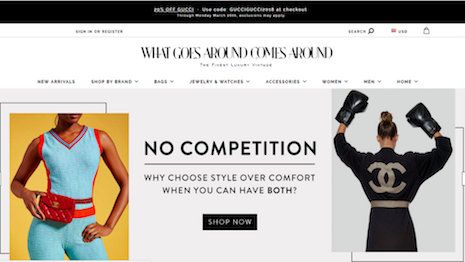 Chanel is contesting. Image credit: What Goes Around Comes Around
Chanel is contesting. Image credit: What Goes Around Comes Around
By Milton Springut On March 14, Swiss fashion giant Chanel filed suit against What Goes Around Comes Around (WGACA), a group of related companies that sells pre-used “vintage” luxury-brand bags and other accessories on its Web site and in five bricks-and-mortar stores located in expensive shopping districts around the country. What is unusual about the suit is that Chanel is not claiming that WGACA’s items are not authentic. Rather, Chanel is asserting that WGACA uses the Chanel brand, promotional materials and promotional photos in a way that misleads consumers to believe that there is an association between it and WGACA, when in fact Chanel refused to enter into such an association. Similar cases have been brought before. What makes this case notable is that many of the activities that Chanel complains about involve social media and other 21st-century means of promotion. The case could be a landmark in drawing the line between permissible and impermissible uses of a brand by third parties. Legal principles As we have written before, trademark law differs from patent and copyright law in one basic way: its purpose is not to protect creativity, but to protect the right of a merchant or company to identify goods as its own, and to protect consumers from confusion and deception that one company’s goods are another’s. Not all uses by a third party of a brand owner’s trademark are forbidden – only those that create a likelihood of confusion among consumers. Very simple – no confusion, no infringement. What kind of confusion? Courts have recognized several kinds. The most basic is confusion as to who manufactures a product – a “Brand X” product is recognized as made by the company that owns the “Brand X” mark. But another form of confusion is confusion as to association or sponsorship. A store or other retail outlet cannot use another’s trademark in a way that confuses or misleads consumers into believing the store is an authorized dealer, for example, or that its services – for example, repair services on the product – are authorized by the brand owner. On the other hand, if the product truly emanates from the brand owner, then anyone is free to sell it, and is free to advertise the fact that it is selling Brand X product. To summarize, the key legal principles that apply are:
- Anyone may sell genuine goods that bear a trademark. There is no requirement in United States law that the seller be authorized by the brand owner – even if the sales are not “authorized” they are perfectly legal.
- The seller may truthfully advertise that it sells authentic product of that brand, and use the brand’s trademarks to inform the public of such. If a store truly sells, say, genuine Gucci, Fendi and Prada items, it may say so in advertising.
- On the other hand, the seller may not use the marks or other symbols to falsely imply it is an authorized dealer of the brand.
- Nor may the seller falsely imply that its services related to the product are authorized. Thus a seller may say, for example, “we provide our own warranty on the product,” but not “covered by the manufacturer’s warranty” if that is not so.
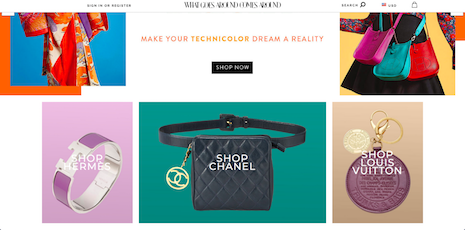 What Goes Around Comes Around Web site with Chanel vintage merchandise. Image credit: What Goes Around Comes Around
What Goes Around Comes Around Web site with Chanel vintage merchandise. Image credit: What Goes Around Comes Around
- The Web site offers “scores” of secondhand Chanel products, making Chanel one of the most featured brands offered. “The mere volume of Chanel-branded products offered for sale on the WGACA Web site suggests to consumers that WGACA has a relationship with Chanel that enabled WGACA to accumulate such a significant inventory.”
- Although the Web site offers other brands such as Bottega Venata, Celine, Christian Dior, Fendi, Gucci, Hermes and Louis Vuitton, the “greatest number” of products are Chanel.
- The WGACA Web site promotes itself as “The Finest Luxury Vintage” and “the leading purveyor of authentic luxury vintage since 1993,” and has stated that “WGACA has internationally acclaimed collections of luxury houses such as Chanel …”
- Visitors to the site are never advised that WGACA is not affiliated with Chanel.
- The WGACA home page features a sale of Chanel-branded handbags, accessories, apparel and jewelry displaying Chanel’s famous CC Monogram trademark and Chanel’s iconic handbags.
- Chanel is listed first in the non-alphabetical list of brands, under the heading “Shop by Brand.” [This has changed since, and Chanel is now part of an alphabetized list.]
- The WGACA Web site makes “repeated and unnecessary use of Chanel’s famous trademarks, by including in the visual look and feel of the Web site Chanel-branded designs that are not offered for sale by WGACA and by posting images and content exclusively associated with Chanel.
- Use of phrases such as “WGACAChanel handbags in-store & online!,” “In honor of Coco Chanel’s 134th bday enjoy 20% off Chanel bags….#WGACACHANEL” and “Our rare #Chanel No. 5 perfume bottle bag now available.”
- Some of WGACA’s Instagram pages include photographs of models and influencers wearing or carrying Chanel handbags that clearly display Chanel’s famous CC monogram and photographs of Chanel’s iconic handbags.
- WGACA refers to secondhand Chanel products as “our #WGACACHANEL” or with the designation “#WGACACHANEL”.
- One Instagram post featured the advertising copy: “This Chanel won’t wear itself. Shop our exclusive collection @ruelala. #WGACACHANEL #repost.”
- On Coco Chanel’s birthday, the “#WGACACHANEL” hashtag on Instagram featured an entry: “‘Simplicity is the keynote of all elegance.’ Celebrating @Chanelofficial & the woman who created my favorite quotes (and bags) on her birthday this week with @whatgoesaround nyc – they’re offering 20% - 30% off all Chanel until tomorrow! So major I had to share ♥ #WGACACHANEL #chanel.”
- Some of WGACA’s Instagram pages feature photographs from previous Chanel advertising campaigns, including those featuring famous models hired by Chanel.
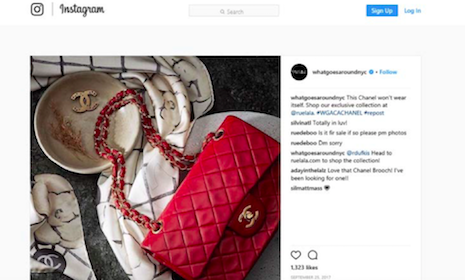 There it is again: Chanel bag shown in What Goes Around Comes Around Instagram post. Image credit: What Goes Around Comes Around Instagram
There it is again: Chanel bag shown in What Goes Around Comes Around Instagram post. Image credit: What Goes Around Comes Around Instagram
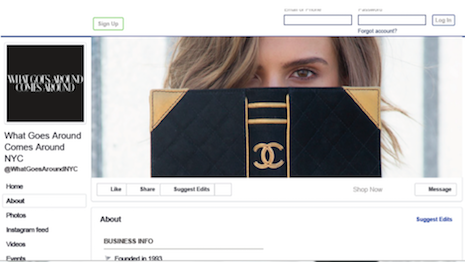 That's right, Chanel again: What Goes Around Comes Around Facebook post. Image credit: What Goes Around Comes Around Facebook
That's right, Chanel again: What Goes Around Comes Around Facebook post. Image credit: What Goes Around Comes Around Facebook
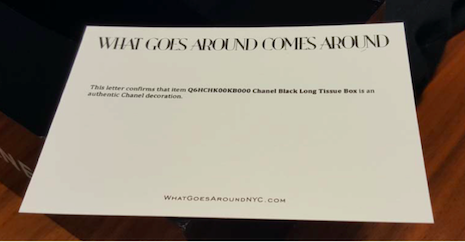 More in the letter than the spirit: What Goes Around Comes Around "Letter of Authenticity" for Chanel vintage product. Image credit: What Goes Around Comes Around
More in the letter than the spirit: What Goes Around Comes Around "Letter of Authenticity" for Chanel vintage product. Image credit: What Goes Around Comes Around
 Milton Springut is a partner at Springut Law PC
Milton Springut is a partner at Springut Law PC
